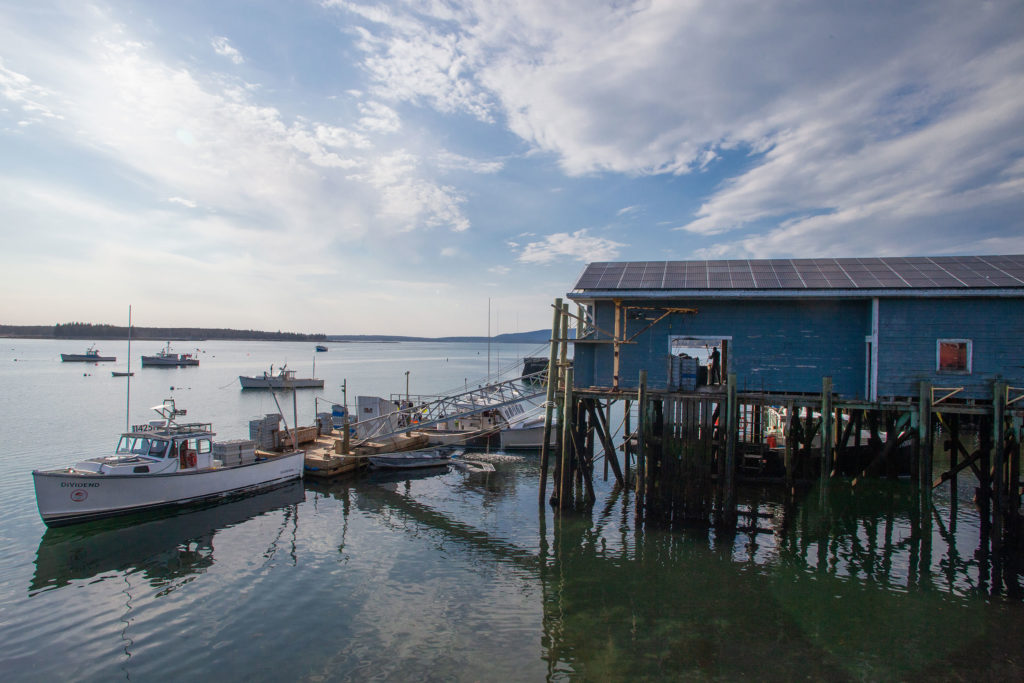ROCKLAND — The Island Institute is one of five organizations in the country recently awarded a contract for the Energy Transitions Initiative Partnership Project (ETIPP), a new partnership sponsored by the U.S. Department of Energy (DOE) to provide resources and access to on-the-ground support for remote and islanded communities in the United States seeking to transform their energy systems and lower their vulnerability to energy disruptions. Through this initiative, the Island Institute will be awarded $330,000 over three years by the National Renewable Energy Laboratory (NREL) to work alongside Maine’s island communities to help address their energy and infrastructure challenges.
Residents of Maine’s 15 year-round, unbridged island communities face electricity rates as high as four times the national average and heating fuel costs that are a dollar more per gallon than their mainland counterparts. Energy systems on remote islands are impacted by aging infrastructure, seasonal fluctuations in demand, and lack of efficiencies of scale. For more than a decade, the Island Institute has been working with year-round island communities in Maine and beyond to increase their access to cleaner, more reliable, and more cost-effective energy sources. As a result, significant investments in energy efficiency and renewable energy projects are helping to increase community resilience to equipment failures, transportation disruptions, and fluctuations in energy markets, but additional need remains.
Nearly all remote and islanded communities in the United States today share one thing in common: They are pursuing holistic, long-term strategies to shore up their vulnerability to major shifts in the environment, economy, and society. However, overcoming these challenges and reducing risk often requires more resources than what is available in some of the nation’s smallest communities. As a partner in a new initiative, Island Institute aims to bridge that gap by providing technical assistance and on-the-ground support for communities seeking to research and implement new clean energy initiatives.
Building on the Islanded Grid Resource Center (IGRC), a previous collaboration between the Island Institute, NREL, New England island communities, and partner organizations from Alaska and Hawaii, the Institute will support Maine islands by connecting them with the tools and resources provided by NREL. On-the-ground support from Island Institute staff and a national network of island-based peers will help communities to realize their specific energy goals.
Since 2007, the Island Institute has been partnering with islands on energy-related issues. It has supported communities to make critical investments in local infrastructure, developed model programs that have been replicated across the Maine coast and beyond, and informed policy to better address the clean energy needs of islands. For eight years, it hosted the annual Island Energy Conference, a venue to highlight Maine island community leadership with a national audience and connect with peers and technical experts.
“The Island Institute and Maine island communities have been recognized nationally for a commitment to better understanding and confronting the unique energy challenges that islands face,” explained Suzanne MacDonald, chief community development officer at the Island Institute. “The ETIPP contract will resource these communities with best-in-class technical assistance and peer support as they continue with their efforts to access cleaner, more affordable energy sources.”
Together, the geographically-diverse coalition formed by ETIPP will work alongside competitively selected communities, empowering them to plan for, withstand, and recover from disruptions and proactively address their energy and infrastructure challenges. The ETIPP network will provide technology-neutral technical assistance that prioritizes local challenges, values, and goals. In winter 2020, island communities will be invited by NREL and the Island Institute to apply to participate in this multi-year, collaborative effort.
About the Energy Transitions Initiative Partnership Project (ETIPP)
This cross-sector initiative will build on the proven resilience framework developed by the DOE Office of Energy Efficiency and Renewable Energy’s Energy Transitions Initiative (ETI). Pooling the tools and technical assets of community-based organizations, including the Island Institute and four other community-based partners, with the cross-cutting experience and expertise of DOE’s Water Power Technologies Office, Solar Energy Technologies Office, National Renewable Energy Laboratory, Pacific Northwest National Laboratory, Lawrence Berkeley National Laboratory, and Sandia National Laboratories, the ETI Partnership Project (ETIPP) will combine deep energy sector experience with specialized local expertise to address energy challenges, build capacity, and accelerate the sharing of best practices and innovations.


